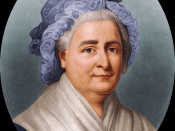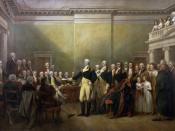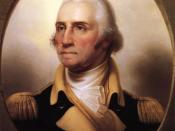Slavery was a part of American history for thousands of years. Even George Washington, who was the much admired and respected commander-in-chief of the Continental Army, and the first President of the United States of America, owned slaves. The biography An Imperfect God: George Washington, His Slaves, and the Creation of America by Henry Wiencek talks about George Washington's life as a plantation owner at Mount Vernon, as well as his role in the creation of America. According to Wiencek, even though Washington owned slaves, he was not a brutal slave owner. "General Washington treats his slaves far more humanely than do his fellow citizens of Virginia. Most of these gentlemen give their blacks only bread, water and blows" (Wiencek 631). He encouraged fairness whenever possible and fired many overseers on account of laziness, lack of discipline, and cruelty toward the slaves. In one way Washington reconciled his ownership of slaves by treating them like they were people and not just property.
He did not free his slaves, but did not inflict pain on them for no reason. Washington was admired by Southern plantation owners because he owned slaves and Northern abolitionists because he was kind to his slaves. This was one way he was able to secure his position as a leader of a revolution to create a nation based on natural rights.
Washington used his discipline from the plantation on the battlefield and in politics. Early in life, Washington truly believed that black people were inferior to whites. He grew up on a plantation where slaves were treated poorly. Washington initially thought of slaves with feelings of superiority. Eventually, throughout the course of his life, he slowly made steps to integrate blacks and whites.
The war provided perfect opportunity for this integration. The Continental Army was in...


